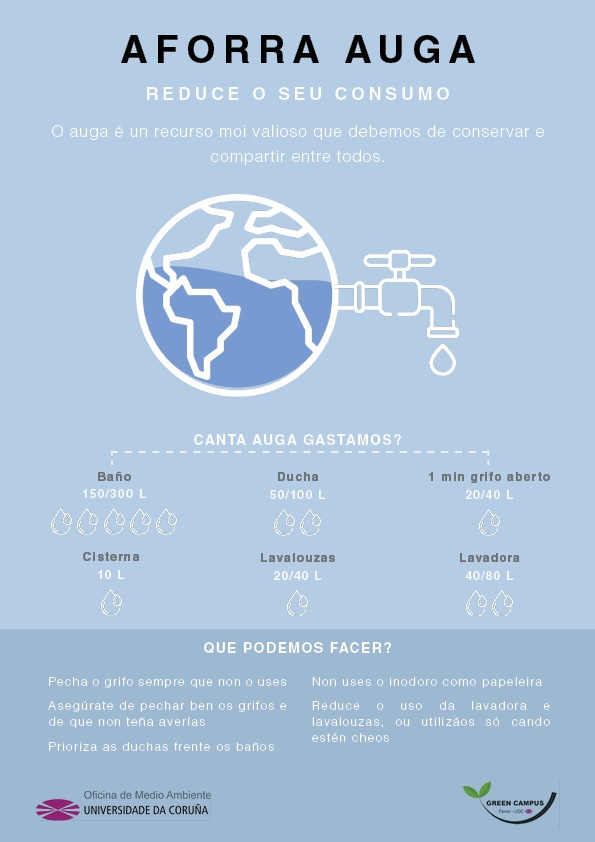Green Campus Ferrol
© Silas Baisch on Unsplash
Water and energy
OPTIMISATION OF WATER CONSUMPTION
Water is an essential resource for the development of life on the planet. It is important to know that water occupies three quarters of the planet, but the amount of water is only 3%, of which only 0.3% is suitable for human consumption. Therefore, saving water is essential.
– What can we do?
- Take a shower instead of a bath: running a bath requires approximately 200 litres, whereas a five-minute shower uses a quarter of that.
- Don’t use the toilet as a waste: it can clog the pipes, increasing water consumption. Do not throw away non-degradable wipes and cotton buds, as these are some of the most polluting products. Every time the toilet is flushed, 10 litres of water are consumed.
- Do not use toilet paper with dyes and perfumes: they are highly polluting.
- Opt for the energy efficiency of household appliances: look at the water consumption of household appliances before putting them on the market.
- Use household appliances: you spend much less water using a household appliance than washing by hand. Washing a dish wastes between 120 litres with the tap open, compared to 25 litres of water a year for a dishwasher running empty.
- Turn off the taps properly: a badly turned off tap means losing 50 litres of water a day.
- Don’t let the water run while you’re shaving or brushing your teeth: you’ll save up to 12 litres of water.
- Use full household appliances.
- Wash your car in a car wash station or with a bucket and a rag: you consume 10 times less water than using a hosepipe, which consumes 500 litres of water.
ENERGY SAVING
The saving of electrical energy is a fundamental element for the use of energy resources, which allows us to optimise the use of our electrical appliances and increase their useful life. By saving energy we are reducing the large consumption of fuel required to generate electricity, and in the same way we are avoiding the emission of gases that pollute our atmosphere. Therefore, saving energy is one of the best ways to contribute to slowing down climate change, avoiding the additional production of energy and emissions into the atmosphere.
– Advantages of energy savings
- Improvement of the economy of the households: reduce the electricity bill.
- Reduces health problems: by reducing the environmental damage caused by greenhouse gas and particulate emissions.
- Improves the environment: reduces consumption of natural resources
– What can we do?
A change in habits and attitudes can favour greater efficiency in the use of electricity, the rational use of energy resources and the preservation of our natural environment.
- Take advantage of natural light: open the curtains or blinds.
- Turn off the light before leaving a room: only light the places where it is needed.
- Turn off the computer screen: a computer that is not turned off can represent up to 70% of daily consumption. Diminish the brightness and contrast of the screen.
- Switch off the electrical equipment: unplug the power supply at the end of the day.
- It uses LED light bulbs: their energy consumption is 10 times lower.
- Do not put hot food in the refrigerator: you will avoid unnecessary energy consumption.
- Use the washing machine and the dishwasher when they are switched off: you will save water and electricity.
- Use the stairs instead of the lift, whenever possible.
- Buy seasonal and locally produced food: they do not require extra consumption of fuel and electricity.
- Unplug the cooler: the air creates an illumination that can lead to an extra 20% of electricity consumption. Make sure that the doors are always properly closed.
- Use modern low-consumption appliances: the difference in price with high-consumption electrical appliances is offset by the long-term energy savings.
